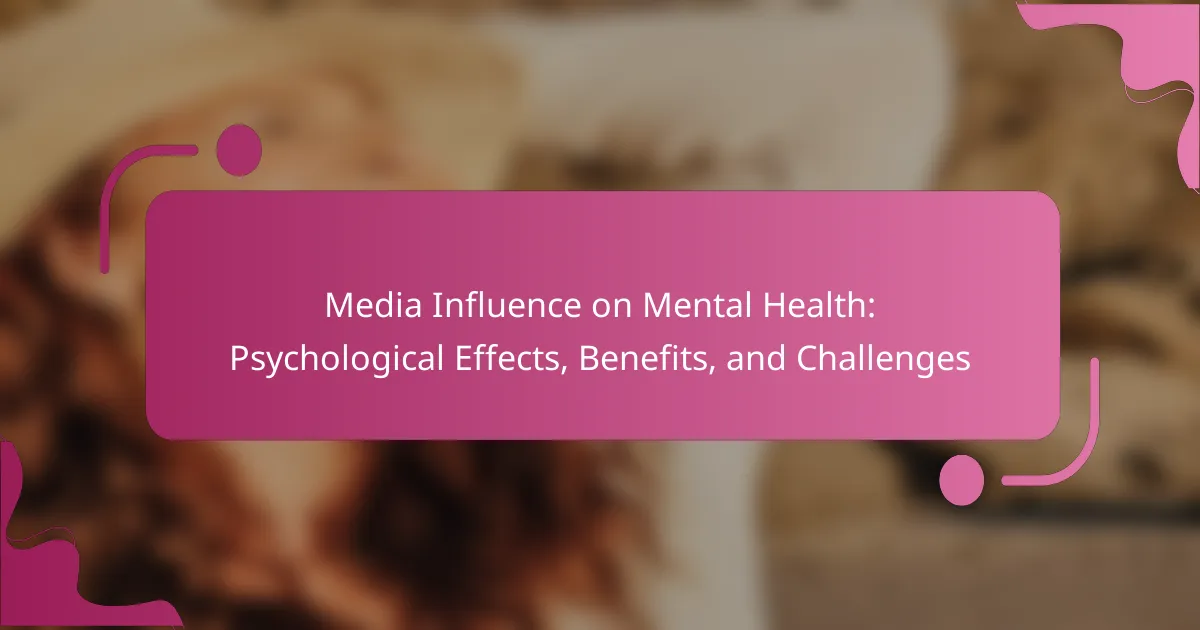Media consumption significantly affects mental health, presenting both benefits and challenges. It can enhance well-being through community support and information while also contributing to anxiety and distorted self-image. Understanding the psychological effects of media, the importance of mindful consumption, and the role of media literacy is essential for navigating these complexities. This article explores the dual impact of media on mental health, highlighting both positive influences and potential risks.
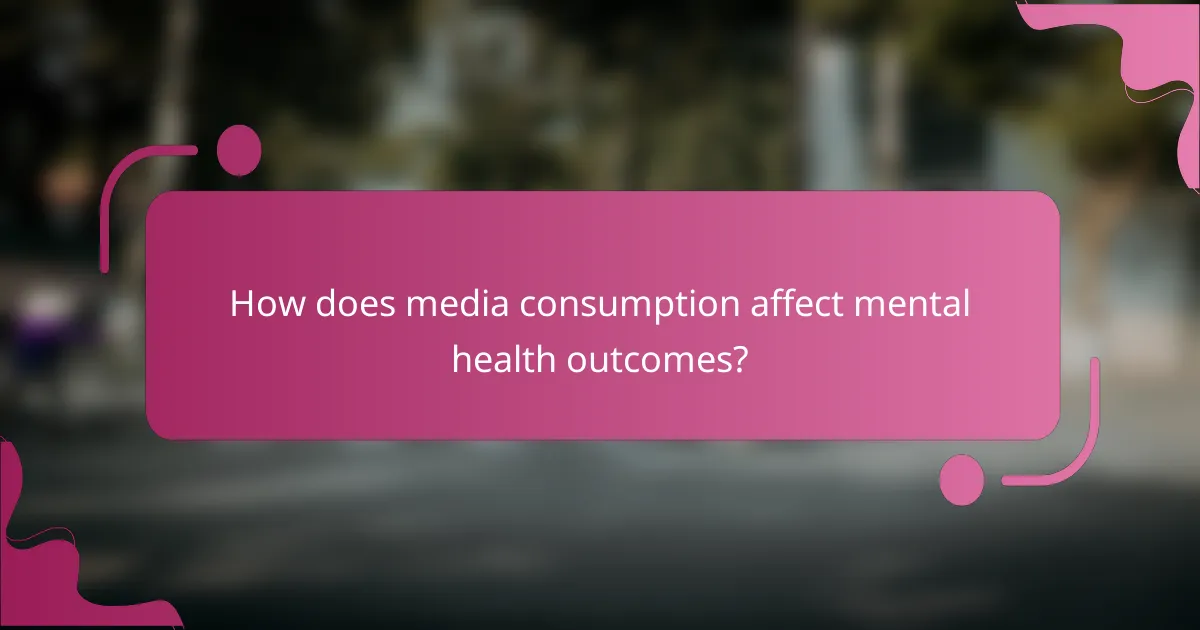
How does media consumption affect mental health outcomes?
Media consumption can significantly impact mental health outcomes, influencing well-being positively or negatively. Excessive exposure to negative news can lead to anxiety and depression, while engaging with positive content may enhance mood and provide social support.
Research indicates that social media can create feelings of inadequacy, affecting self-esteem. Conversely, online communities can offer valuable emotional support and foster connections. The balance of media exposure is crucial for mental health, highlighting the need for mindful consumption.
Studies show that limiting screen time can reduce stress and improve overall mental health. Engaging with uplifting content and maintaining real-life interactions can mitigate adverse effects. Understanding these dynamics empowers individuals to make healthier media choices.
What psychological effects are associated with social media use?
Social media use can lead to various psychological effects, including anxiety, depression, and low self-esteem. These effects arise from constant comparison, cyberbullying, and unrealistic portrayals of life. Research indicates that excessive use correlates with increased feelings of loneliness and isolation. On the positive side, social media can foster community support and connection, providing mental health resources and reducing stigma. Balancing usage is crucial to mitigate negative impacts while harnessing potential benefits.
Which demographics are most vulnerable to negative impacts?
Young adults and adolescents are most vulnerable to negative impacts from media influence on mental health. This demographic often experiences heightened anxiety, depression, and body image issues linked to social media exposure. Research indicates that 90% of teens use social media, increasing their risk of mental health challenges. Additionally, individuals with pre-existing mental health conditions may also be significantly affected by media portrayals. As a result, targeted interventions are crucial to mitigate these risks and promote healthier media consumption practices.
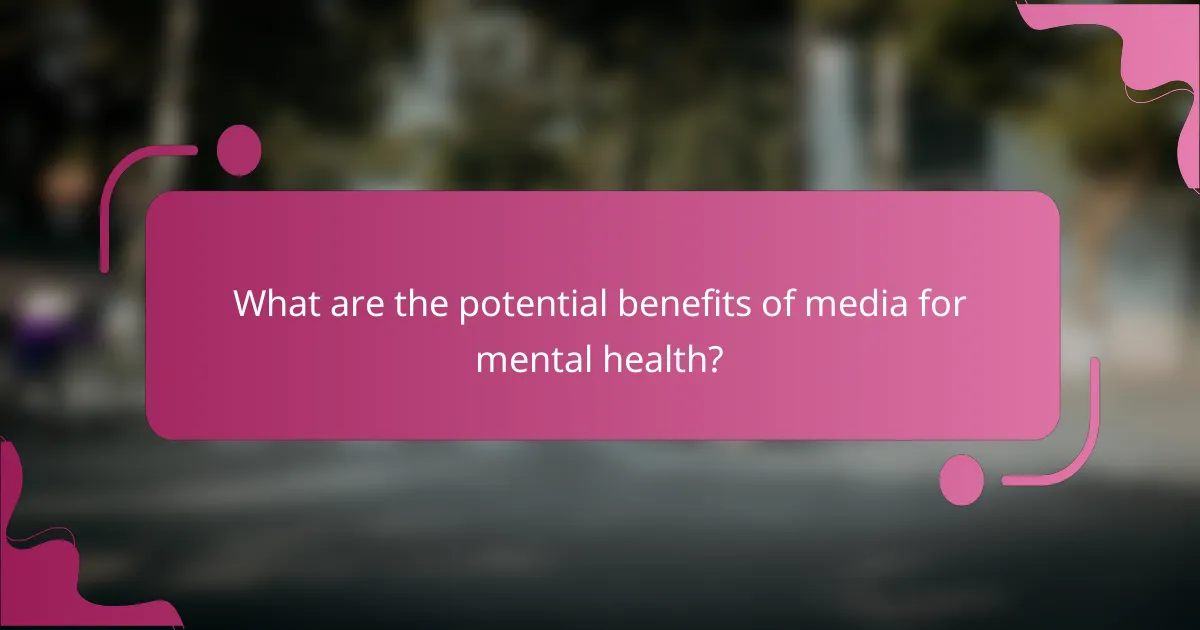
What are the potential benefits of media for mental health?
Media can positively influence mental health by providing support, information, and connection. It can reduce feelings of isolation and encourage self-expression. Engaging with media can also promote awareness of mental health issues and provide access to resources. For example, social media platforms can foster community support, while educational content can enhance understanding of mental health challenges.
How can digital platforms promote mental well-being?
Digital platforms can effectively promote mental well-being by offering accessible resources and supportive communities. They provide information on mental health, foster connections, and encourage self-expression. For example, social media campaigns raise awareness and reduce stigma. Online therapy platforms enhance accessibility to professional help. Additionally, mental health apps offer tools for mindfulness and stress management. These platforms can empower users, creating a positive impact on their mental health.
What role do online support communities play in mental health?
Online support communities significantly enhance mental health by providing connection, understanding, and resources. They foster a sense of belonging, reduce isolation, and offer shared experiences. Participants often report improved emotional well-being through peer support and access to valuable information. These communities can also present challenges, such as misinformation and negative interactions, which require careful navigation.
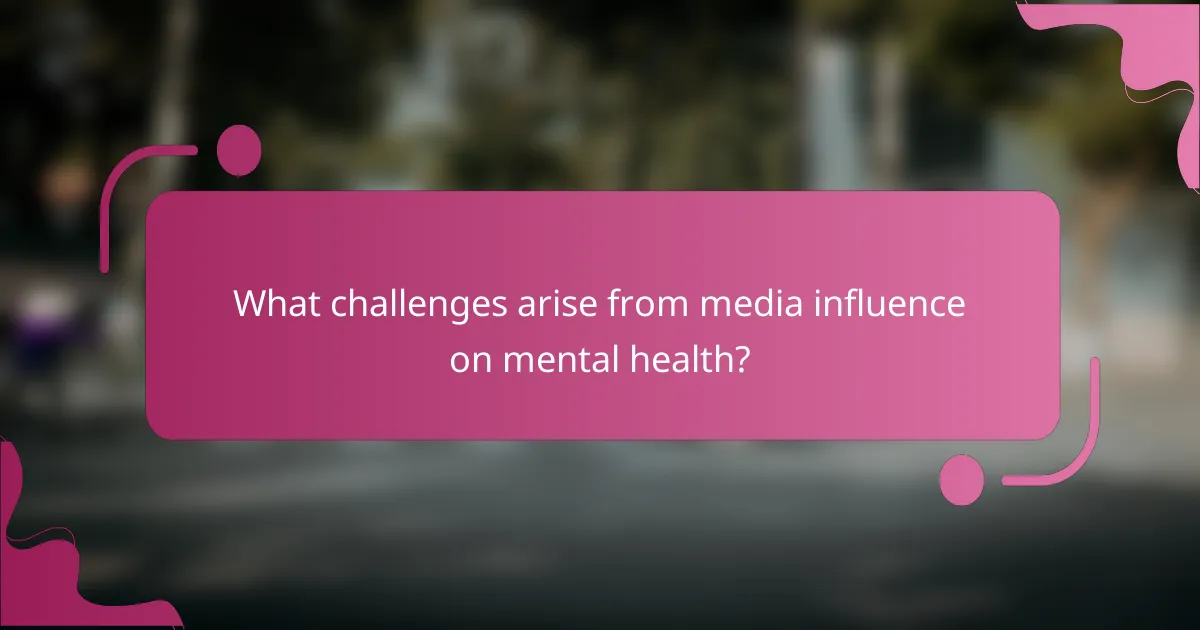
What challenges arise from media influence on mental health?
Media influence poses significant challenges to mental health, including increased anxiety, distorted self-image, and social comparison. These effects often stem from exposure to unrealistic standards portrayed in various media formats. For example, constant exposure to idealized body images can lead to body dissatisfaction and eating disorders. Additionally, the pressure to maintain an online persona can exacerbate feelings of inadequacy and loneliness. As a result, mental health professionals emphasize the need for critical media literacy to mitigate these challenges.
How does misinformation affect mental health perceptions?
Misinformation significantly distorts mental health perceptions by promoting stigma and misunderstanding. It can lead to negative self-image and increased anxiety among individuals. For instance, misleading portrayals of mental health conditions in media can create fear and reluctance to seek help. Research shows that exposure to inaccurate information correlates with heightened stress levels and social isolation. As a result, addressing misinformation is crucial for fostering a more accurate understanding of mental health, encouraging open conversations, and reducing stigma.
What are the risks of comparison culture on social media?
Comparison culture on social media poses significant risks to mental health. It can lead to feelings of inadequacy, anxiety, and depression. Users often measure their self-worth against curated, idealized portrayals of others. This constant comparison diminishes self-esteem and fosters a sense of isolation. Studies show that frequent engagement with social media correlates with increased negative emotions, particularly among younger users. As a result, developing a healthier relationship with social media is crucial for mental well-being.
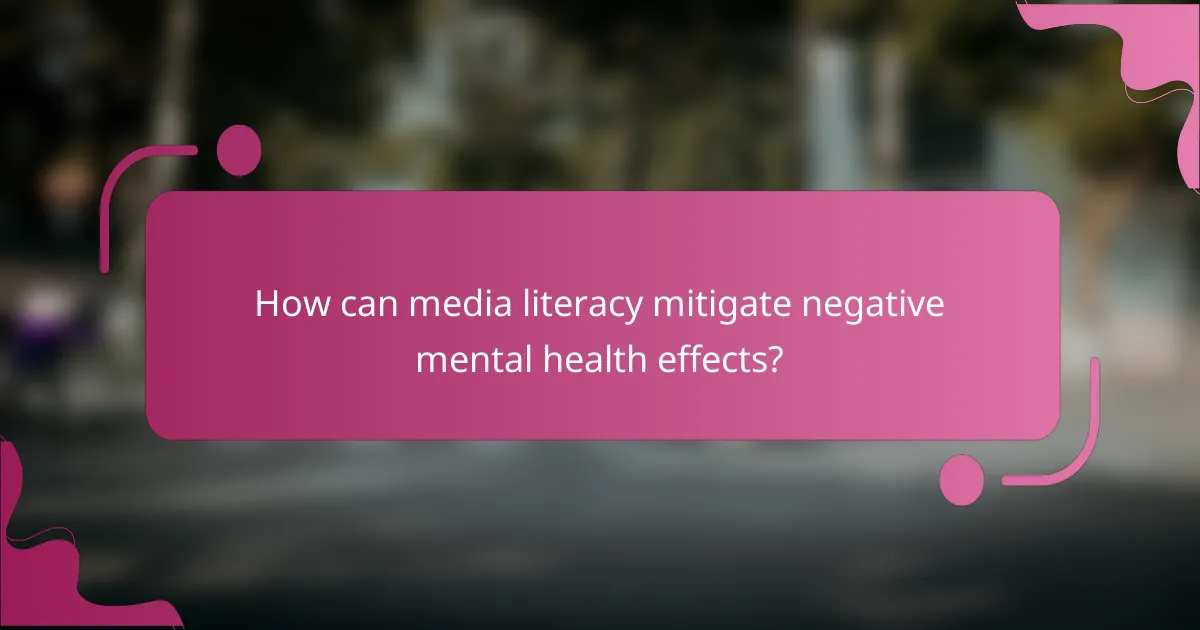
How can media literacy mitigate negative mental health effects?
Media literacy can significantly reduce negative mental health effects by empowering individuals to critically evaluate media messages. It fosters resilience against harmful content, enabling better emotional regulation and self-esteem. For example, individuals with strong media literacy skills are less likely to internalize unrealistic body images portrayed in advertising. Research indicates that enhanced media literacy correlates with lower anxiety and depression levels among youth. By promoting awareness of media manipulation tactics, media literacy equips individuals to navigate digital landscapes more effectively, ultimately improving their mental well-being.
What strategies can individuals use to navigate media consumption?
Individuals can navigate media consumption by setting boundaries, curating content, and practicing mindfulness. Establishing time limits helps reduce exposure to negative influences. Curating content allows individuals to focus on positive and educational media. Mindfulness practices enhance awareness of emotional responses to media, promoting healthier consumption habits.
Which educational programs enhance media literacy skills?
Educational programs that enhance media literacy skills include critical media studies, digital literacy courses, and workshops focused on analyzing media messages. These programs teach individuals to evaluate the psychological effects of media on mental health, fostering awareness of both benefits and challenges. For instance, critical media studies emphasize understanding media influence, while digital literacy courses cover safe online practices. Additionally, workshops can provide hands-on experience in identifying misinformation and its potential impact on mental well-being.
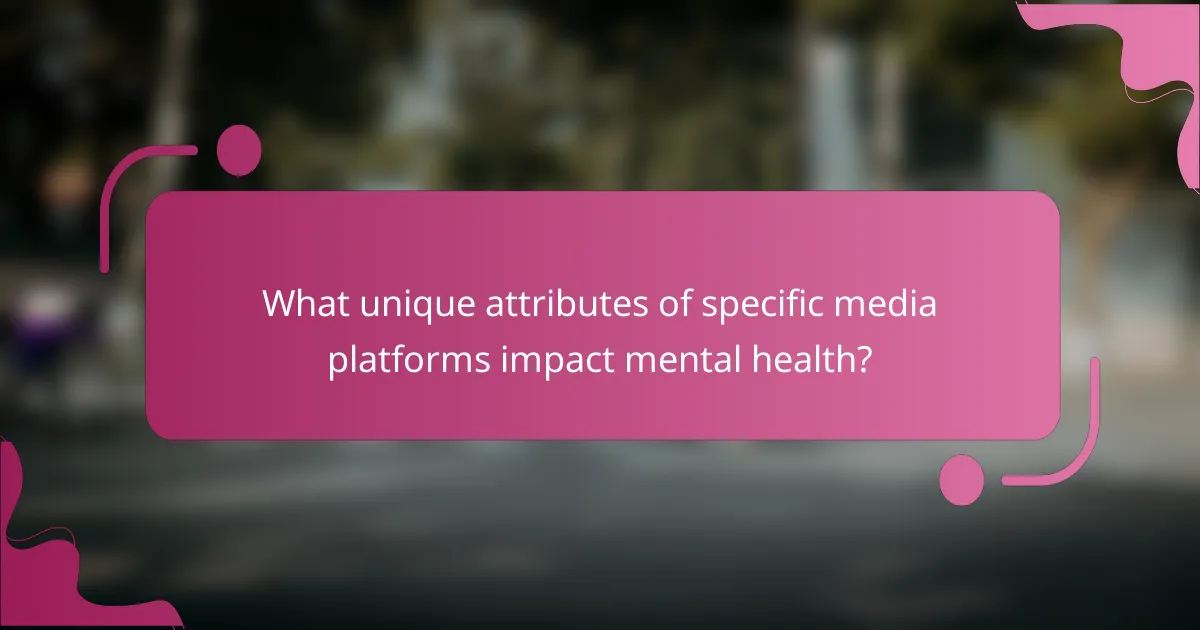
What unique attributes of specific media platforms impact mental health?
Unique attributes of specific media platforms significantly impact mental health through their design and user engagement strategies. For instance, platforms that prioritize user-generated content can foster community support but may also expose users to negative comparisons. Algorithms that promote constant notifications can increase anxiety and disrupt focus. Additionally, the visual nature of platforms like Instagram can lead to body image issues due to curated portrayals of reality. These unique characteristics shape how users interact with content, influencing their psychological well-being.
How does the design of social media platforms influence user behavior?
The design of social media platforms significantly shapes user behavior by influencing engagement, interaction, and emotional responses. Features like notifications encourage frequent use, while algorithms curate content that aligns with user preferences, affecting mental health outcomes. For instance, excessive exposure to idealized images can lead to comparisons and anxiety. Additionally, the design fosters community building, which can provide social support but may also expose users to negative interactions. Understanding these dynamics is crucial for promoting healthier online experiences.
What aspects of video content affect viewer mental states?
Video content affects viewer mental states through emotional engagement, cognitive processing, and social connection. Emotional storytelling can elicit empathy and provoke strong feelings, impacting mood. Cognitive processing involves how viewers interpret and understand content, influencing their beliefs and attitudes. Social connection arises from shared experiences, fostering a sense of community. These aspects can lead to both positive benefits, such as improved well-being, and challenges, like increased anxiety or desensitization.
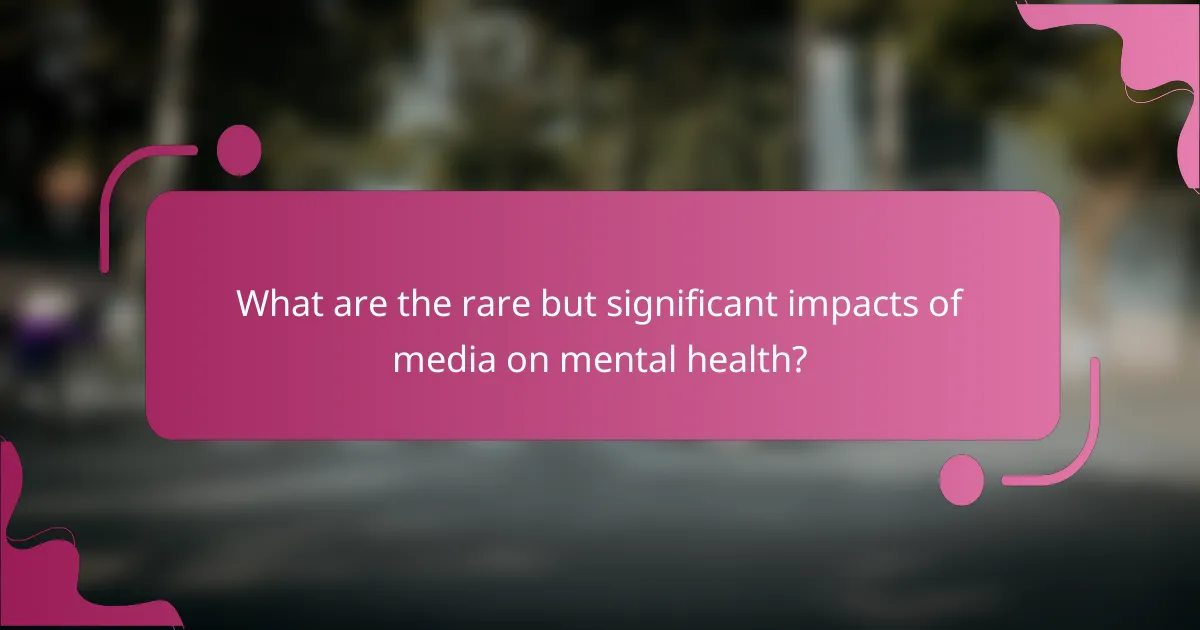
What are the rare but significant impacts of media on mental health?
Media can have rare but significant impacts on mental health, both positive and negative. One notable positive impact is the role of media in raising awareness about mental health issues, which can lead to increased support and understanding. Conversely, exposure to negative content can exacerbate anxiety and depression in vulnerable individuals. Additionally, social media can create a sense of community, yet it may also foster feelings of isolation when users compare themselves to others. Understanding these rare effects is crucial for harnessing media’s potential while mitigating its risks.
How can media exposure trigger latent psychological conditions?
Media exposure can trigger latent psychological conditions by amplifying stressors or negative emotions. Constant exposure to distressing news or unrealistic portrayals can activate pre-existing vulnerabilities. Studies show that individuals with underlying anxiety or depression may experience heightened symptoms when exposed to negative media narratives. Additionally, social comparison through curated online content can exacerbate feelings of inadequacy, leading to further psychological distress.
What is the relationship between media and sleep disorders?
Media consumption negatively impacts sleep disorders by disrupting sleep patterns and increasing anxiety. Excessive screen time, especially before bed, can lead to insomnia and reduced sleep quality. Studies show that blue light emitted from devices inhibits melatonin production, which is crucial for sleep regulation. Furthermore, engaging with distressing content can elevate stress levels, exacerbating sleep issues. Reducing media exposure, particularly in the evening, can improve sleep outcomes for those affected by sleep disorders.
What are best practices for healthy media consumption?
To practice healthy media consumption, prioritize content that promotes well-being and limits exposure to negativity. Set time limits for media use, especially social media, to prevent overwhelm. Choose diverse sources to gain balanced perspectives. Engage critically with content, questioning its impact on your mood and thoughts. Take breaks to disconnect and reflect on media’s influence.
